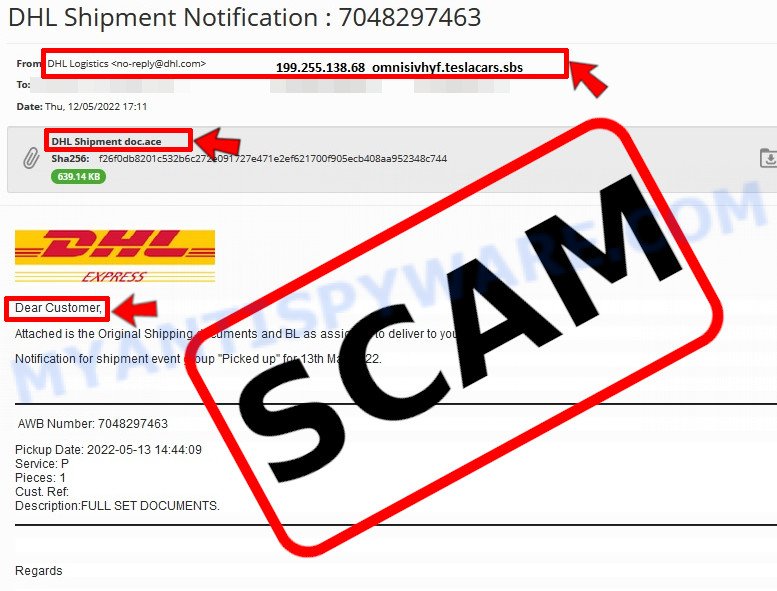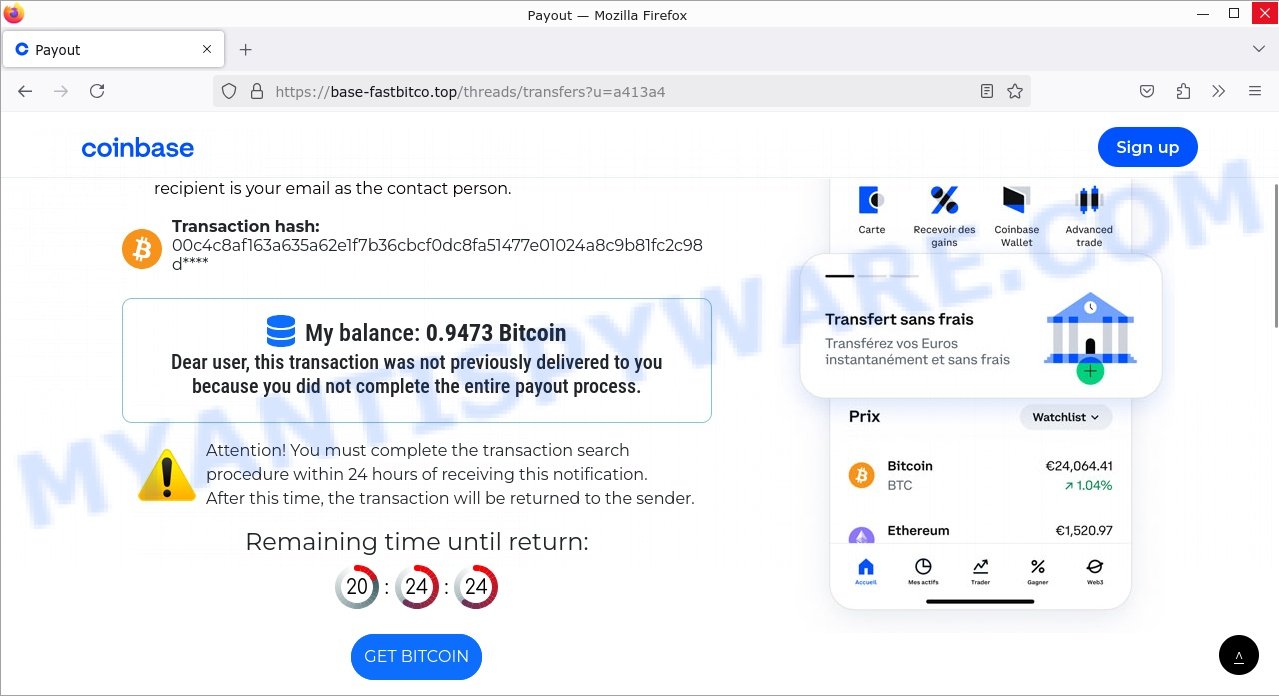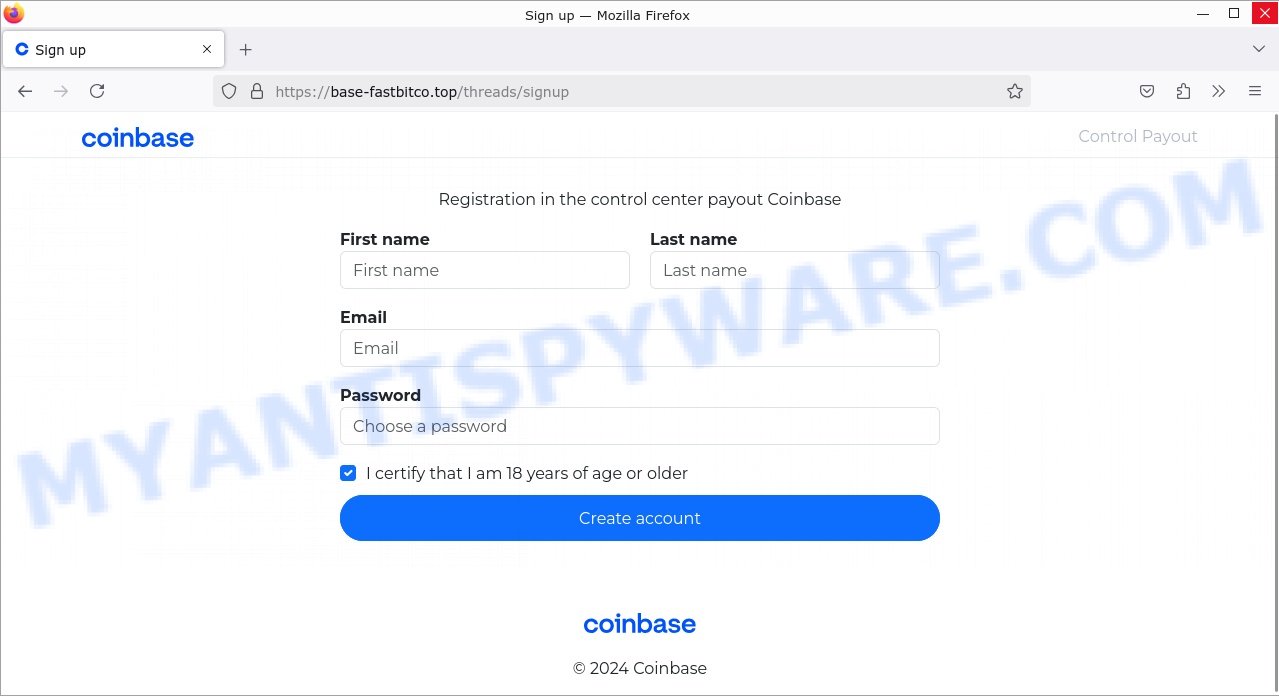Myantispyware is warning about a “Coinbase – You Have 1 New Transaction” scam that targets users by pretending to be a real notification from Coinbase. This scam is spread through fake emails with links or attachments, claiming there’s a Bitcoin transaction waiting for you from Binance to your Coinbase account. It tricks you into thinking you need to act fast by saying there’s a 24-hour deadline to finalize the transaction.
The scam site has fake elements like a countdown timer and a “GET BITCOIN” button. If you click it, you’re asked to enter personal info like your name, email, and password, supposedly to complete the “payout”. Then, it tells you to search for the transaction using Coinbase and to contact fake support for help. They want you to give further payment info like your Bitcoin wallet or credit card number, plus pay a fake service fee of $62 to get the Bitcoin payout.
In reality, the scammers just want to get your money and personal details. It’s important to be cautious and not fall for these tricks.💡 If you come across this scam, delete any suspicious emails and do not enter any personal information. Stay safe and protect your details by being aware of these scams.
A typical “Coinbase – You Have 1 New Transaction” scam text:
You have 1 new transaction
We have sent a notification to your email address that a new transaction has been received.
Our Coinbase service has received a payment order from Binance.com and sends you the payout.
The sender of the payment is indicated by Binance.com, and the recipient is your email as the contact person.Transaction hash:
00c4c8af163a635a62e1f7b36cbcf0dc8fa51477e01024a8c9b81fc2c98d****
My balance: 0.9473 Bitcoin
Dear user, this transaction was not previously delivered to you because you did not complete the entire payout process.Attention! You must complete the transaction search procedure within 24 hours of receiving this notification.
After this time, the transaction will be returned to the sender.
Remaining time until return:
20:24:48
Summary Table
| Name | Coinbase – You Have 1 New Transaction Scam |
| Type | Phishing, Scam, Social Engineering, Fraud |
| Fake Claim | The user has a pending transaction of 0.9473 Bitcoin |
| Disguise | Legitimate notification from Coinbase |
| Related Domains | base-fastbitco.top, cb-notifiers.top |
📧 What to Do When You Receive the “Coinbase – You Have 1 New Transaction” Scam Email
We advise everyone who receives this email to follow the simple steps below to protect yourself from potential scams:
- ❌ Do not believe this email.
- 🔒 NEVER share your personal information and login credentials.
- 📎 Do not open unverified email attachments.
- 🚫 If there’s a link in the scam email, do not click it.
- 🔍 Do not enter your login credentials before examining the URL.
- 📣 Report the scam email to the FTC at www.ftc.gov.
If you accidentally click a phishing link or button in the “Coinbase – You Have 1 New Transaction” Email, suspect that your computer is infected with malware, or simply want to scan your computer for threats, use one of the free malware removal tools. Additionally, consider taking the following steps:
- 🔑 Change your passwords: Update passwords for your email, banking, and other important accounts.
- 🛡️ Enable two-factor authentication (2FA): Add an extra layer of security to your accounts.
- 📞 Contact your financial institutions: Inform them of any suspicious activity.
- 🔄 Monitor your accounts: Keep an eye on your bank statements and credit reports for any unusual activity.
🔍 How to Spot a Phishing Email
Phishing emails often share common characteristics; they are designed to trick victims into clicking on a phishing link or opening a malicious attachment. By recognizing these signs, you can detect phishing emails and prevent identity theft:

💡 Here Are Some Ways to Recognize a Phishing Email
- ✉️ Inconsistencies in Email Addresses: The most obvious way to spot a scam email is by finding inconsistencies in email addresses and domain names. If the email claims to be from a reputable company, like Amazon or PayPal, but is sent from a public email domain such as “gmail.com”, it’s probably a scam.
- 🔠 Misspelled Domain Names: Look carefully for any subtle misspellings in the domain name, such as “arnazon.com” where the “m” is replaced by “rn,” or “paypa1.com,” where the “l” is replaced by “1.” These are common tricks used by scammers.
- 👋 Generic Greetings: If the email starts with a generic “Dear Customer”, “Dear Sir”, or “Dear Madam”, it may not be from your actual shopping site or bank.
- 🔗 Suspicious Links: If you suspect an email may be a scam, do not click on any links. Instead, hover over the link without clicking to see the actual URL in a small popup. This works for both image links and text links.
- 📎 Unexpected Attachments: Email attachments should always be verified before opening. Scan any attachments for viruses, especially if they have unfamiliar extensions or are commonly associated with malware (e.g., .zip, .exe, .scr).
- ⏰ Sense of Urgency: Creating a false sense of urgency is a common tactic in phishing emails. Be wary of emails that claim you must act immediately by calling, opening an attachment, or clicking a link.
- 📝 Spelling and Grammar Errors: Many phishing emails contain spelling mistakes or grammatical errors. Professional companies usually proofread their communications carefully.
- 🔒 Requests for Sensitive Information: Legitimate organizations typically do not ask for sensitive information (like passwords or Social Security numbers) via email.
✅ Conclusion
We hope this article has helped you understand more about the “Coinbase – You Have 1 New Transaction” Scam and how to avoid falling victim to scammers. If you have received a phishing email that is similar but not identical to the example above, please post it in the comments section of this article. This helps us warn other users about potential scams and improve our resources to protect you better. Stay safe and vigilant! 🛡️



















